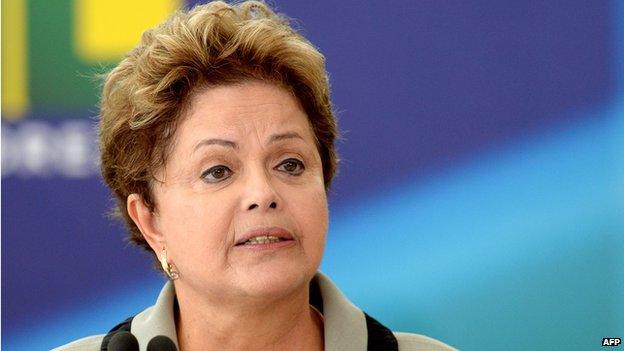Getting to know Dilma over dinner
- Published
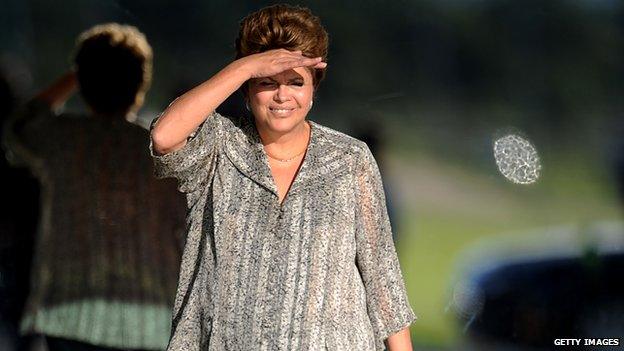
President Dilma Rousseff will stand for re-election in October
She loves British television costume dramas and longs for the ordinariness of a "normal" life. She's also proud to show guests around the place she calls home - surely one of the finest buildings ever designed by the Brazilian architect Oscar Niemeyer - and even admits to once riding around Brasilia on the back of a friend's moped for an hour because she had the urge.
Dilma Rousseff is also very defensive and passionate about how Brazil has organised and prepared for the 2014 Fifa World Cup.
Invited, with a handful of other foreign correspondents, to dinner with Brazil's president, I arrived at the Alvorada Palace to meet the elected leader of 200 million people and the world's sixth biggest economy, not really knowing what kind of person to expect.
Ms Rousseff rarely gives media interviews and much less so to the foreign press. But these are important times for Brazil, a country that finds itself in the global spotlight, and not all of the attention it is getting is positive.
With barely a week to go before the opening game of the World Cup kicks off in Sao Paulo, the first thing Brazil's president asks me is: "Don't you think it's going to happen?"
The question is rhetorical. "Of course it's going to happen, and everything will be ready," she fires back.
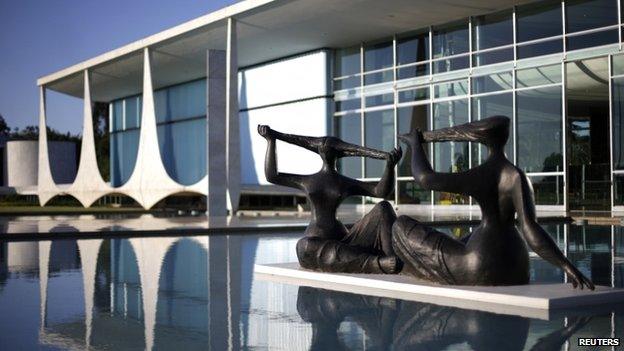
The Alvorada Palace, designed by Oscar Niemeyer, is the official residence of Brazil's president
Ms Rousseff's government has been stung by relentless criticism, from commentators at home and abroad, about the vast sums of public money being spent on building new stadiums and the delays or cancellations to promised infrastructure projects.
"Everywhere in the world these big engineering projects always go down to the wire," the president told our small group as we stood overlooking the Alvorada's exquisite gardens, unsure of how formal this meeting was going to be or how much a normally reticent leader would open up.
Her government has been repeatedly accused of not finishing numerous public transport and other infrastructure projects in time for the Cup. "You can't finish a metro in two years - at least not in Brazil - perhaps only in China," retorts the president.
"Anyway," she goes on, "these jobs will be finished eventually because they're essential projects for the whole country, not just for the World Cup".
Informal
Agreeing to differ on whether all will be forgotten once the tournament begins on 12 June, we move into the dining room and Dilma (as everyone in Brazil knows their president) opens up.
As journalists tuck into steak or a Bahian prawn stew, she goes for a modest pasta dish and doesn't touch a drop of alcohol all night.
She plays down "scare stories" in the press about transport problems during the Cup, the safety of stadiums and is especially dismissive of some media reports that Brazil is in the midst of a dengue fever epidemic.
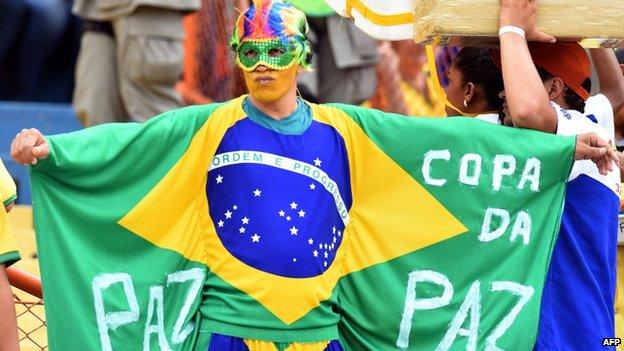
The 2014 World Cup starts on 12 June
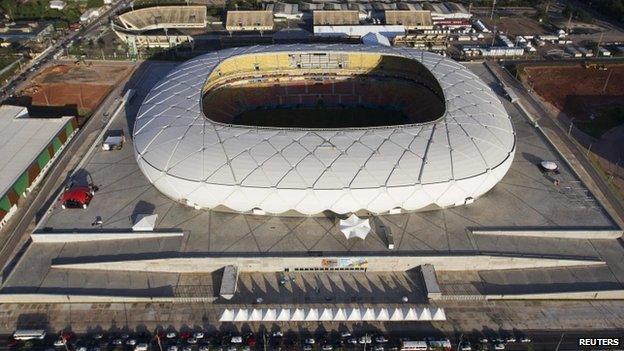
Preparations for the 2014 World Cup have been plagued by missed deadlines and delays
Her informality with people she is meeting for the first time is engaging. Her grasp of detailed policy issues - especially macroeconomics - is impressive and persuasive.
You get the feeling that while, like every Brazilian, she will always give the impression of being absorbed by the four-week-long football festival, her real concerns and passions are for the longer-term challenges her country faces.
"In Brazil we don't have small projects - we have to resolve our problems with big, macro solutions," says the president as she outlines in some detail how the energy needs of millions of Brazilians living in the north of the country are being addressed.
Not swayed
If, as currently looks likely, Dilma Rousseff is re-elected later this year for a second presidential term, the question for many is whether she will relax Brazil's heavily protectionist economic policies.
From what I heard over Brazilian stew and rice tonight, the lady is not for moving when it comes to her economic principles and what she says is being achieved.
"We're not going to risk increasing unemployment or recession," President Rousseff says pointedly.
The centre-left leader is clearly not swayed by the arguments of some commentators, especially in the financial press, who are forever pleading with her to relax import duties, make Brazilian industry more competitive and reduce the burden on the state.
President Rousseff is proud of a welfare record that has brought 30 million Brazilians out of poverty and is no fan of those who urge her to adopt a tariff-free, market-led approach when "there are improvements in public services and especially education" to achieve first.
She concludes a lengthy passage about her economic strategy by saying, "the redistribution of income and resources is an important part of our policy and we defend the right to continue doing that".
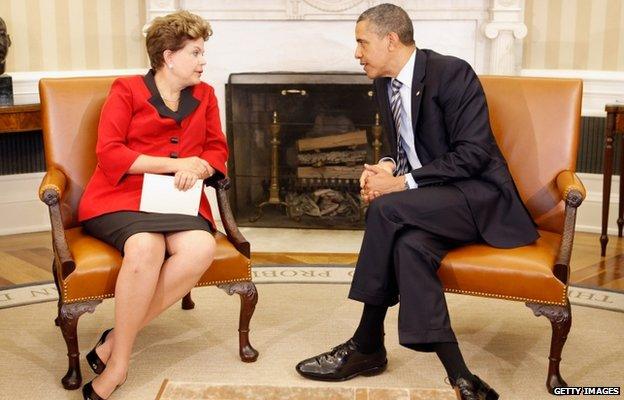
President Rousseff called off a state visit to Washington last year in a row over allegations of US espionage
A second Rousseff term would almost certainly have to be more engaged on the international scene.
One of the reasons that we in the foreign media rarely get close to her is that foreign policy is such a small part of her overall political platform.
Top of that agenda, surely, is repairing relations with Washington after Ms Rousseff controversially cancelled a state visit to the US last year over allegations of NSA spying on Brazilian politicians and companies.
"I think that what is needed is a strong signal that it can never be repeated," she says when asked what it would take to get relations with Washington back on track.
"We have a strong, strategic partnership with the US and I have a lot of respect for [President] Obama. We only have a pause in our relationship, it is not paralysed," she says.
There is much speculation that gesture may be made during a forthcoming visit to Brazil by US Vice-President Joe Biden.
"Biden's a seducer," says our host. "We're not yet married but we're sort of dating. It'll happen eventually," adds President Rousseff, in a tongue-in-cheek assessment of the relationship between Brasilia and the White House.
Right trajectory
Conversation inevitably returns to the Cup and all it encompasses.
Without prompting, Ms Rousseff addresses the issue of anti-government and anti-World Cup protests that plagued Brazil this time last year and which, say some observers, could return to the streets of Sao Paulo and Rio de Janeiro for the World Cup.
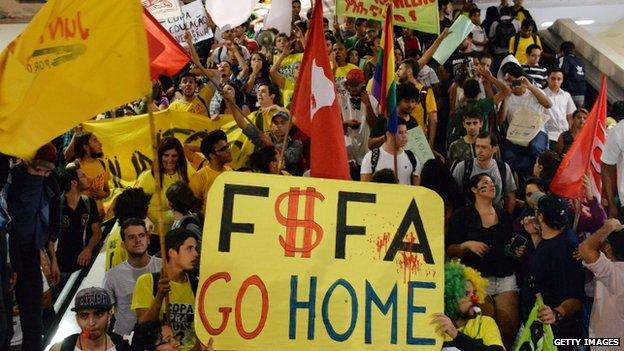
Activists have been rallying against the billions of dollars being spent on this month's football tournament
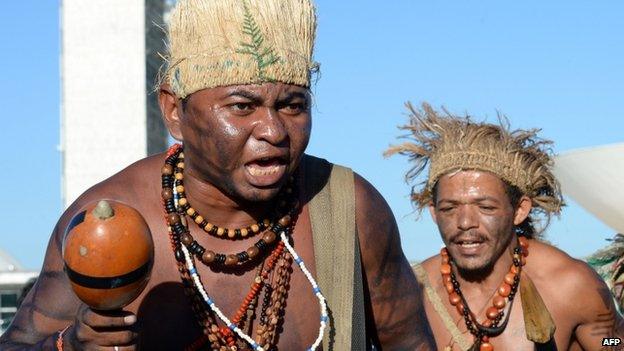
Indigenous people demanding land rights have joined the protests
"Those who want to protest will be allowed to do so 100%," begins the president. But then, she adds: "The vast majority of Brazilians will be supporting the Cup and protesters will not be allowed to interfere or disrupt the tournament.".
Unlike the events of June 2013, her government now seems determined the protests will not gain momentum. How the thousands of extra police and soldiers being deployed on the streets of Brazil react will be closely watched.
President Rousseff is proud of her country's ever-stronger democracy and, despite concerns about chronic rates of violence and criminality in the big cities, she is convinced Brazil is on the right trajectory.
She cuts across a question about politics and the World Cup - whether her government is trying to "use" the tournament for political ends.
"I was in prison during the 1970 World Cup. There was a brutal, tough dictatorship in this country. They tortured many of their victims and some people questioned whether to support the team was to support the dictatorship," said the woman who back in 1970 was a student leader who suffered for her beliefs.
"It's different now. Yes, the government helps to organise the Cup but I don't see a political relationship between the two."
Reveal more
Our evening with the president ended with anecdotes about how she would love to walk the streets unnoticed and her great passion for reading.
Dilma Rousseff is in her mid-sixties but shows no sign of slowing. Despite falling ratings in the polls over the state of the economy and handling of the World Cup, she shows no suggestion whatsoever that she might even lose October's elections.
A woman who says the six hours' sleep she gets each night are "nowhere near enough," she still has time to show straggling foreign journalists around the Niemeyer building and pose with us for photographs.
It has been a useful public relations exercise for a president who is expected to reveal much more of herself on the international stage if she is re-elected to a second term in office.
For me, it was an equally valuable few hours spent in the company of arguably one of the world's most powerful but least understood leaders.
- Published28 May 2014
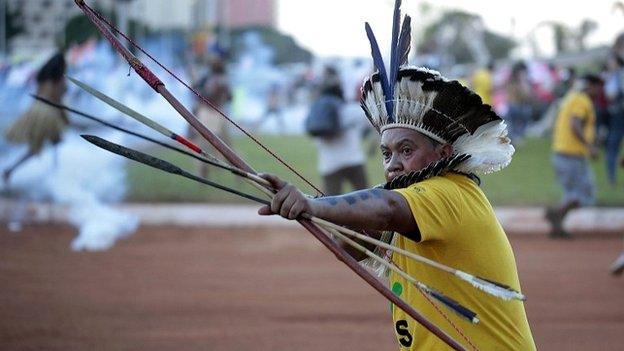
- Published6 May 2014
- Published30 May 2014
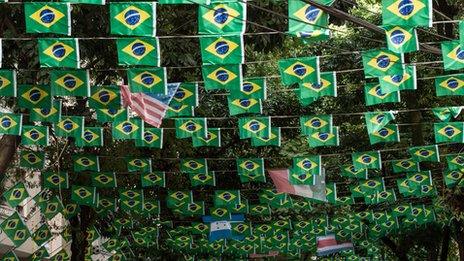
- Published13 April 2016
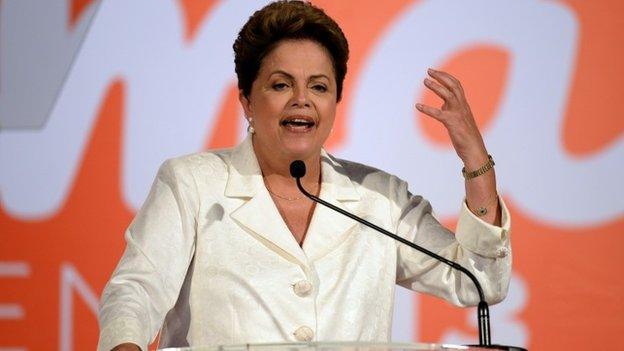
- Published1 May 2014
